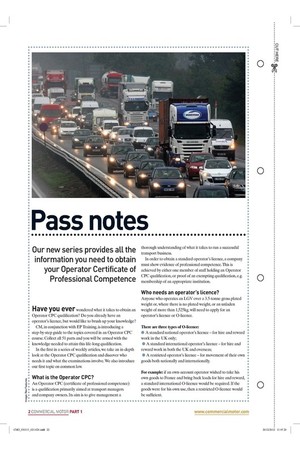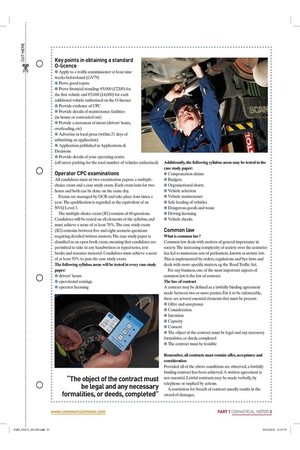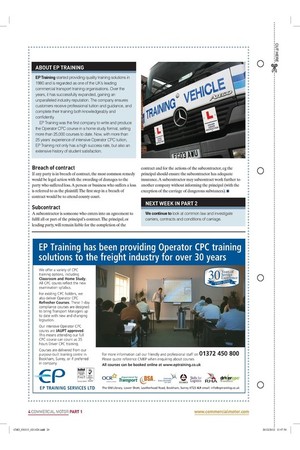ass notes
Page 15

Page 16

Page 17

If you've noticed an error in this article please click here to report it so we can fix it.
Our new series provides all the information you need to obtain your Operator Certificate of Professional Competence Have you ever wondered what it takes to obtain an Operator CPC qualification? Do you already have an operator's licence, but would like to brush up your knowledge?
CM, in conjunction with EP Training, is introducing a step-by-step guide to the topics covered in an Operator CPC course. Collect all 51 parts and you will be armed with the knowledge needed to attain this life-long qualification.
In the first in a series of weekly articles, we take an in-depth look at the Operator CPC qualification and discover who needs it and what the examinations involve. We also introduce our first topic on common law What is the Operator CPC?
An Operator CPC (certificate of professional competence) is a qualification primarily aimed at transport managers and company owners. Its aim is to give management a thorough understanding of what it takes to run a successful transport business.
In order to obtain a standard operator's licence, a company must show evidence of professional competence. This is achieved by either one member of staff holding an Operator CPC qualification, or proof of an exempting qualification, e.g. membership of an appropriate institution.
Who needs an operator's licence?
Anyone who operates an LGV over a 3.5-tonne gross plated weight or, where there is no plated weight, or an unladen weight of more than 1,525kg, will need to apply for an operator's licence or 0-licence.
There are three types of 0-licence: • A standard national operator's licence — for hire and reward work in the UK only; • A standard international operator's licence — for hire and reward work in both the UK and overseas; • A restricted operator's licence — for movement of their own goods both nationally and internationally.
For example: if an own-account operator wished to take his own goods to France and bring back loads for hire and reward, a standard international 0-licence would be required. If the goods were for his own use, then a restricted 0-licence would be sufficient.
Key points in obtaining a standard 0-licence • Apply to a traffic commissioner at least nine weeks beforehand (GV79) • Prove good repute • Prove financial standing: €9,000 (£7,200) for the first vehicle and €5,000 (£4,000) for each additional vehicle authorised on the 0-licence • Provide evidence of CPC • Provide details of maintenance facilities (in-house or contracted out) • Provide a statement of intent (drivers' hours, overloading, etc) • Advertise in local press (within 21 days of submitting an application) • Application published in Applications & Decisions • Provide details of your operating centre (off-street parking for the total number of vehicles authorised) Operator CPC examinations All candidates must sit two examination papers: a multiplechoice exam and a case study exam. Each exam lasts for two hours and both can be done on the same day.
Exams are managed by OCR and take place four times a year. The qualification is regarded as the equivalent of an NVQ Level 3.
The multiple choice exam (R1) consists of 60 questions. Candidates will be tested on all elements of the syllabus, and must achieve a score of at least 70%. The case study exam (R2) contains between five and eight scenario questions requiring detailed written answers The case study paper is classified as an open book exam, meaning that candidates are permitted to take in any handwritten or typed notes, text books and resource material. Candidates must achieve a score of at least 50% to pass the case study exam.
The following syllabus areas will be tested in every case study paper: • drivers' hours • operational costings • operator licensing Additionally, the following syllabus areas may be tested in the case study paper: • Compensation claims • Budgets • Organisational charts • Vehicle selection • Vehicle maintenance • Safe loading of vehicles • Dangerous goods and waste • Driving licensing • Vehicle checks Common law What is common law?
Common law deals with matters of general importance in society. The increasing complexity of society over the centuries has led to numerous acts of parliament, known as statute law. This is implemented by orders, regulations and bye-laws and deals with more specific matters, eg the Road Traffic Act.
For any business, one of the most important aspects of common law is the law of contract.
The law of contract A contract may be defined as a lawfully binding agreement made between two or more parties For it to be enforceable, there are several essential elements that must be present: • Offer and acceptance • Consideration • Intention • Capacity • Consent • The object of the contract must be legal and any necessary formalities, or deeds, completed • The contract must be feasible Remember, all contracts must contain offer, acceptance and consideration Provided all of the above conditions are observed, a lawfully binding contract has been achieved. A written agreement is not essential. Lawful contracts may be made verbally, by telephone or implied by actions.
A conviction for breach of contract usually results in the award of damages.
Breach of contract If any party is in breach of contract, the most common remedy would be legal action with the awarding of damages to the party who suffered loss. A person or business who suffers a loss is referred to as the plaintiff. The first step in a breach of contract would be to attend county court.
Subcontract A subcontractor is someone who enters into an agreement to fulfil all or part of the principal's contract. The principal, or leading party, will remain liable for the completion of the contract and for the actions of the subcontractor, eg the principal should ensure the subcontractor has adequate insurance. A subcontractor may subcontract work further to another company without informing the principal (with the exception of the carriage of dangerous substances). • ABOUT EP TRAINING EPTraining started providing quality training solutions in 1980 and is regarded as one of the UK's leading commercial transport training organisations. Over the years, it has successfully expanded, gaining an unparalleled industry reputation. The company ensures customers receive professional tuition and guidance, and complete their training both knowledgeably and confidently.
EP Training was the first company to write and produce the Operator CPC course in a home study format, selling more than 25,000 courses to date. Now, with more than 25 years' experience of intensive Operator CPC tuition, EP Training not only has a high success rate, but also an extensive history of student satisfaction.
NEXT WEEK IN PART 2 We continue to look at common law and investigate carriers, contracts and conditions of carriage.









































